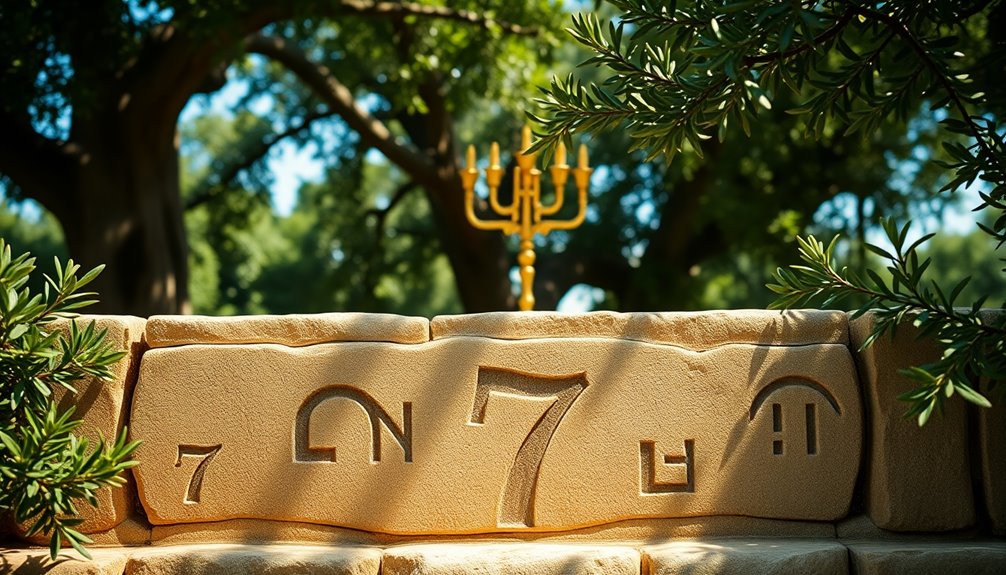The number 7 carries deep spiritual meaning, symbolizing divine completeness and wisdom. In many traditions, it represents a powerful connection to the sacred, reflecting God's intentional order, as seen in the creation story and various biblical references. You might encounter the significance of seven in rituals, such as Jewish weddings or the Shemittah cycle, which emphasizes renewal. Despite its common association with luck, the number's true essence embodies spiritual depth and completeness. If you're curious about how to incorporate the significance of 7 into your life, there's more to explore on its transformative power and practices.
Key Takeaways
- The number 7 symbolizes completeness and divine order, representing a deep connection to spiritual truths across various traditions.
- In biblical contexts, it signifies divine perfection, as seen in creation and the covenants established by God.
- Ancient Jewish practices like the Shemittah cycle illustrate the importance of renewal and rest associated with the number 7.
- Meditation and reflection on the number 7 can enhance spiritual awareness and promote personal growth and healing.
- Commonly misunderstood as merely a symbol of luck, 7 holds profound spiritual significance tied to divine wisdom and completeness.
Introduction

The number 7 holds a special place in many spiritual traditions, often seen as a symbol of completeness and divine order. When you look at the number seven, you might feel that it embodies a sense of spiritual awakening and growth. This powerful number resonates with themes of perfection, encouraging you to reflect on your own journey.
In various religious contexts, the number seven signifies important aspects of life and spirituality. For example, in Christianity, the seven sacraments serve as vital rituals that guide your spiritual development. Similarly, the seven blessings recited during Jewish weddings highlight the significance of divine order in relationships and community.
The seventh day, a day of rest, emphasizes the necessity for spiritual reflection and renewal in your life. By acknowledging the number seven, you're invited to explore your inner self, fostering introspection and self-discovery.
As you engage with these themes, you may find that the number seven not only represents completeness but also acts as a catalyst for your spiritual growth, urging you to deepen your connection to the divine and the world around you.
Biblical Significance of Seven

In the Bible, the number seven holds profound significance, appearing over 700 times and often symbolizing completion and divine perfection.
You'll find it in key moments, like God resting on the seventh day after creation and the covenants made with Noah.
Let's explore both primary and secondary references to understand its importance in biblical teachings.
Primary Bible References
Throughout the Bible, the number 7 stands out as a powerful symbol of completeness and perfection. You'll find this number appearing over 700 times, often in the context of God's creation and covenant with humanity. For instance, God rested on the seventh day after creation, establishing the Sabbath as a vital day of rest and worship (Genesis 2:2-3). This act emphasizes the importance of completion in the divine narrative.
Moreover, Jesus made seven statements from the Cross, marking the fulfillment of His earthly mission. This reinforces the theme of completion associated with the number seven. In the Book of Revelation, the seven churches symbolize the universal Church, conveying messages of spiritual vigilance and divine guidance to all believers.
Additionally, when Jesus instructed His followers to forgive "seventy times seven" (Matthew 18:21-22), He highlighted the concept of boundless forgiveness, showcasing the depth of God's mercy.
Each of these references illustrates how the number seven serves as a guide on your spiritual path, reminding you of the completeness and perfection that God embodies in your life.
Secondary Bible References
Biblical texts are rich with secondary references to the number seven, further emphasizing its significance in spiritual matters. The seven days of creation illustrate the completion or perfection of God's work, culminating in rest on the seventh day (Genesis 2:1-2).
This theme of wholeness continues as you explore Jesus' seven statements from the Cross, marking the fulfillment of His mission.
In the book of Revelation, the presence of seven churches, seven seals, and seven trumpets conveys the fullness of Christ's message and divine judgment. The seventh year in ancient Israel was vital too, as it involved the cancellation of debts and the freeing of slaves (Deuteronomy 15:1-2), symbolizing renewal and restoration.
Additionally, when Jesus instructed His followers to forgive "seventy times seven," He highlighted the depth of complete forgiveness, deeply rooted in the biblical meaning of the number seven (Matthew 18:21-22).
Each of these Bible verses reinforces the number's connection to spiritual practice, reminding you that seven signifies completeness and perfection in your spiritual journey.
Ancient Jewish Numerology Practices

The number seven holds profound significance in ancient Jewish numerology, symbolizing divine completion and perfection. This concept is vividly illustrated in the creation narrative of Genesis, where God completes the world in six days and rests on the seventh. This divine completion sets a precedent for the importance of seven in Jewish life.
In Jewish tradition, the practice of reciting seven blessings, known as Sheva Brachot, at weddings highlights the completeness of marital union. This ritual underscores the belief that relationships, like creation, are divinely ordained and complete when blessed.
Moreover, the seven-year agricultural cycle, or Shemittah, mandates that land rests in the seventh year, emphasizing renewal and divine rest. The menorah, a symbol of Jewish identity, features seven branches, representing the light of God and the spiritual illumination bestowed upon the Jewish people.
Significantly, many major Jewish holidays last for seven days, such as Passover and Sukkot, reinforcing the themes of completion and divine presence.
Through these practices, the number seven encapsulates a deeper spiritual connection, reminding you of the divine order and perfection inherent in your faith.
Symbol of Divine Wisdom

In the realm of spiritual symbolism, the number seven stands out as a powerful representation of divine wisdom. This number appears over 700 times in the Bible, consistently symbolizing completeness and spiritual truth. When you consider the seven days of creation, it emphasizes God's order and intentionality, showcasing His divine wisdom in establishing the universe.
Additionally, seven is tied to significant spiritual milestones. For instance, the seven petitions in the Lord's Prayer illustrate a perfect way to communicate with God, reflecting a deep understanding of divine wisdom. You can also see the number seven in rituals and ceremonies, like the seven sacraments in Christianity and the seven blessings in Jewish weddings. These practices highlight the importance of divine wisdom in sacred contexts.
Theological interpretations of seven invite you to explore a deeper understanding of God's nature and the universe. By reflecting on this number, you're encouraged to seek insight through spiritual study and contemplation.
The number seven serves as a reminder of the profound wisdom inherent in the divine, guiding you toward completeness and truth in your spiritual journey.
Misunderstanding Number 7's Symbolism

You might think of the number 7 as just a lucky charm, but its true significance goes much deeper.
Misunderstanding its role in biblical texts can lead to a skewed view of its spiritual meaning, especially regarding completeness and divine order.
Let's clear up these common misconceptions and explore what 7 really represents in a spiritual context.
Debunk Common Misconceptions
Misunderstanding the spiritual significance of the number 7 can lead to a superficial grasp of its true essence. Many people mistakenly see it as just a symbol of luck, but it actually represents completeness and divine perfection. The number 7 appears over 700 times in sacred texts, emphasizing its profound importance in spiritual growth and inner reflection.
You might think of 7 as merely a positive figure, but it's essential to recognize that it also signifies the need for spiritual vigilance and preparedness for challenges. While many associate it with good fortune, this overlooks its deeper implications.
The number 7 invites you to engage in sacred practices and rituals, reflecting cycles of renewal found in traditions like the seven days of creation and the observance of the Sabbath.
Embracing the true nature of the number 7 means acknowledging it as a guide for your spiritual journey. Instead of merely hoping for luck, consider how this number encourages you to connect with the divine, fostering a deeper understanding of your journey through introspection and growth.
Misinterpretation of Biblical Texts
The number 7 holds profound symbolism in biblical texts, yet its interpretation often falls short of its true significance. You might encounter misinterpretations that reduce this powerful number to mere physical completeness. While it appears over 700 times, representing themes of completion and perfection, you risk overlooking its deeper spiritual significance.
For instance, the seven days of creation in Genesis 1 illustrate not just chronology but God's divine order, inviting you to recognize the importance of rest and worship on the seventh day. If you focus solely on the number's surface meaning, you might miss its connection to themes like forgiveness. Jesus' teaching to forgive "seventy times seven" emphasizes the boundless nature of divine mercy, which can be lost in a simplistic reading.
In Revelation, the seven churches symbolize the fullness of Christ's message to humanity. Misinterpretations here can strip away the call for spiritual vigilance and the unique challenges each church faces contextually.
Daily Meditation Practices

Incorporating daily meditation practices can significantly deepen your spiritual awareness, especially when you reflect on personal blessings.
Engaging in group prayer sessions also enhances the experience, allowing you to connect with others while focusing on the meaningful number 7.
Together, these practices can strengthen your spiritual foundation and promote growth. Additionally, cultivating a growth mindset through meditation can help you embrace challenges and enhance your spiritual journey.
Reflect on Personal Blessings
Harnessing the power of daily meditation practices centered around the number 7 can transform your spiritual journey by deepening your connection to your inner self. By dedicating just seven minutes each day to focused meditation, you can reflect on your personal blessings and cultivate a sense of gratitude.
This simple practice not only enhances your spiritual growth but also encourages introspection, allowing you to better understand your life path. As you meditate, consider the seven virtues or the seven sacraments as frameworks to guide your reflections.
These structures help you evaluate your values and how they align with the blessings in your life. By acknowledging what you're grateful for, you reinforce a positive mindset that can shift your perspective on challenges.
Additionally, engaging in a weekly meditation session on the seventh day can serve as a powerful ritual for rest and renewal. This practice promotes a sense of peace and completion, helping you to integrate your reflections into your daily life.
Embrace these moments of introspection, and you'll find that reflecting on your personal blessings can lead to profound spiritual insights and growth.
Group Prayer Sessions
Unity in purpose defines the power of group prayer sessions, where individuals come together to elevate their spiritual practices. These gatherings often embrace the number 7, symbolizing spiritual completeness and enhancing the collective intentions of participants.
When you engage in daily meditation within a group, dedicating seven minutes to silent reflection can lead to profound connections with both your inner self and the divine.
In many spiritual traditions, the practice includes seven sacred intentions or affirmations, promoting collective healing and growth. Each session might focus on seven specific themes, allowing you to explore diverse spiritual dimensions while fostering a sense of community.
By reciting seven prayer requests or blessings during group prayer, you reinforce the energy of shared purpose and intent.
As you participate in these group prayer sessions, you not only deepen your own spiritual journey but also contribute to the collective upliftment of everyone involved.
The synergy created through shared intentions magnifies the impact of your prayers, creating a sacred space for transformation and connection.
Embrace the power of group prayer and watch as it enhances your spiritual completeness and collective energy.
Seven Signifies Divine Completeness

Throughout spiritual traditions, the number seven stands out as a symbol of divine completeness. In the biblical narrative, you'll find the number referenced over 700 times, often linked to God's actions and covenants. For instance, God created the world in six days and rested on the seventh, establishing a divine order that emphasizes the importance of completion. This pattern is reflected in the observance of the Sabbath, where rest signifies a full cycle of creation.
The seven churches mentioned in Revelation embody the fullness of Christ's message, proving that divine guidance is comprehensive and accessible to all. Additionally, the seven seals, trumpets, and bowls in Revelation represent stages of divine judgment, highlighting the completion of God's plan for humanity.
In Jewish tradition, seven holds cultural and spiritual significance, as seen in the seven blessings during weddings and the seven days of mourning. These practices reinforce the idea that seven isn't just a number, but a profound representation of completeness in divine matters. Furthermore, the influence of utilitarian thinkers emphasizes the importance of actions that promote overall well-being, reflecting the completeness sought in spiritual and moral frameworks.
Understanding this aspect can deepen your appreciation of spiritual teachings and the remarkable role of the number seven in your life.
Additional Resources

For those seeking to delve deeper into the spiritual significance of the number seven, a variety of resources are available to enhance your understanding. You might start with books on numerology, where many authors explore the themes of spiritual awakening and personal growth linked to this powerful number.
Look for texts that emphasize the biblical aspects of seven, illustrating its representation of completeness and divine intervention throughout scripture.
Online platforms and forums can also be valuable. Joining discussions with like-minded individuals can deepen your insights into how the number seven influences daily life.
Additionally, consider attending workshops or webinars focusing on spiritual development, where the concept of the seventh day as a day of rest and reflection is often highlighted.
Meditation and journaling can serve as personal tools to explore your connection with the number seven. As you encounter this number in your daily experiences, take a moment to reflect on its message, allowing it to guide your spiritual journey.
Embracing these resources will aid you in recognizing the profound implications of the number seven in your life.
Frequently Asked Questions
What Does the Number 7 Symbolize?
The number 7 symbolizes completion and perfection in various contexts.
You might notice it representing divine intervention, as it appears frequently in significant narratives. For instance, it stands for the seven days of creation, culminating in rest.
It also embodies moral guidance through concepts like the seven deadly sins and virtues.
When you see this number, think of it as a reminder of spiritual growth, introspection, and the importance of being prepared.
What Does God Say About the Number 7?
God emphasizes the number 7 as a symbol of completeness and divine order.
When you read Genesis, you see He rested on the seventh day, signifying the importance of rest.
In Revelation, the seven churches serve as a reminder of His guidance.
Jesus' teaching on forgiving "seventy times seven" illustrates the depth of forgiveness you're called to practice.
Also, the seventh year's debt cancellation highlights God's mercy and restoration in your life.
Is 7 the Number of the Holy Spirit?
Yes, you could consider 7 as the number of the Holy Spirit. It often symbolizes spiritual completeness and divine presence, as seen in biblical references.
When you think about the seven spirits before God's throne or the seven gifts outlined in Isaiah, it highlights the fullness of the Holy Spirit's work in your life.
This number frequently appears in Jesus' teachings and miracles, reinforcing its connection to spiritual transformation and guidance.
What Is the Energy of the Number 7?
The energy of the number 7 invites you to dive deep into introspection and reflection.
It encourages you to seek spiritual truth and connect with your inner self. You'll find that solitude and contemplation are essential for your personal growth.
This number sparks your quest for knowledge and enhances your intuition, helping you bridge the gap between the material and spiritual realms.
Embrace your uniqueness, and trust your inner guidance.










